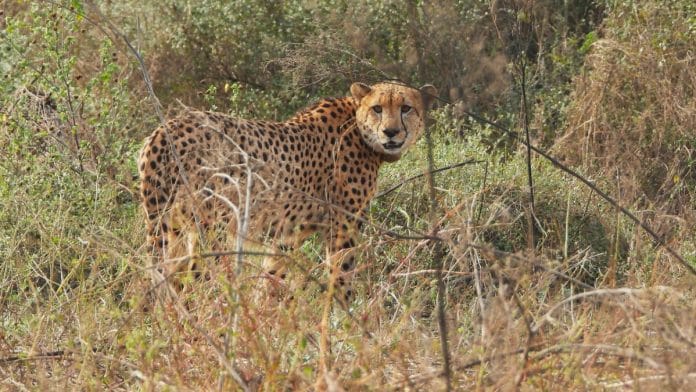Bhopal: Cheetah Jwala and her four cubs—the latest to be released from the enclosures in Kuno National Park—have been let out in the Khajuri forest area of the park.
The development came after the forest department previously released seven cheetahs—the male duo of Agni and Vayu, followed by Cheetah Dhira and, then, Cheetah Asha along with her three cubs.
The release of the cheetahs marks a major step in reintroducing the animals on Indian soil. The cheetahs had gone extinct in 1950. After a wait of over 50 years, the first batch of eight cheetahs were flown in from Namibia, followed by 12 cheetahs from South Africa. Gradually, they are being reintroduced into the wild.
Speaking to The Print, Kuno National Park Chief Conservator of Forests (CCF) Uttam Sharma said, “Considering that these cubs are born in India, they will have it easier to settle in Indian conditions. The mother will also teach the cubs to hunt in the wild in the open forest, making them much more resilient and easily adaptable to Indian flora and fauna.”
The four cubs, including two males and two females, are 13 months old. Now, the forest officials have seven cheetahs and seven cubs left inside the enclosures at Kuno National Park.
The cheetah reintroduction project suffered a major setback in August 2023, after the animals developed parasitic infections in the lacerations around their necks from radio collars. At least six Cheetahs died then.
The forest officials hoped the move would boost tourism, with people reaching Kuno National Park to catch a glimpse of the cheetahs and the cubs in the wild.
“Unlike male cheetahs that travel great distances, the female Cheetahs with cubs are more likely to settle and travel less compared to their male counterparts, it might allow tourists to catch a glimpse of these wild cats,” added Sharma.
Earlier, when the forest department released Agni and Vayu, videos came to light, showing the cheetahs strolling on the city streets at night near school compounds of the Sheopur district.
Subsequently, the government issued an advisory for residents, emphasising that cheetahs are not a threat to humans, urging the residents to maintain a safe distance and to protect children and livestock.
The forest officials are also working to create awareness among residents on handling the situation in case of any encounter with cheetahs. The locals have to make loud noises to scare the cheetah away in case of any contact.
(Edited by Madhurita Goswami)
Also Read: Lover of food, attention & travel, cheetah Pavan was ‘special’ for forest dept officials in Kuno






